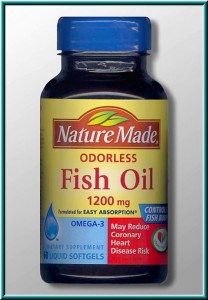Omega-3, prostate cancer link attacked as ‘weak at best,’ radio host Michael Savage says researcher seeking attention
The recent study linked Omega-3 consumption with elevated risk of prostate cancer has come under great attack by the scientific community after gracing countless headlines.

photo Wuhazet (Henryk Żychowski) via Wikimeida Commons
Radio Michael Savage, who holds a pair of Master degrees and a PhD in the medical field held an interview with Anthony D’Amico, professor of Radiation Oncology at Harvard Medical School to discuss what Savage called a “very dangerous report,” “junk science,” and “a bogus study.”
D’Amico was quick to summarize the biggest fault with the new study: “The study really cannot make the conclusion that it’s trying to, because these types of studies are not cause and effect…These studies are simply association and when you have an association type study, the way you strengthen it…is that you try to adjust for that association, for all the things you know can cause prostate cancer.”
Headlines across the headlines took the study as 100% fact: Omega-3 supplements linked to prostate cancer – Fox News.
Of course, on further inspection, the headlines are misleading.
“The fact is that just from this snapshot … we can’t actually say cause of effect, so there is a long way to go before we can say that the cause of this correlation is the actual intake of oily fish.
“So as yet, it is not a cause to panic.” Nutritionist Nicole Berberian told Sky News.
Savage was bold in his assessment of the study attempting to make such broad, sweeping assertions.
“I don’t want to knock the guy that wrote it but he is really a kind of lowly assistant professor who I think was looking for some media attention,” he said criticizing the hyperbole of even saying “fish itself might be harmful or dangerous.”
D’Amico and Savage continued to dissected and pick apart some major flaws in the study: when did the men begin taking fish oils, before or after being diagnosed with cancer
Point to sick people seeking any and all help, like fish oils, to help them feel better.
This left Dr. D’Amico concluding: “The scientific strength of it (the study) is weak, at best.”
Check out the full details of D’Amico talking with Michael Savage here















[…] read more about the online debate click here, here and […]
[…] Omega-3, prostate cancer link attacked as 'weak…The Global DispatchThe recent study linked Omega-3 consumption with elevated risk of prostate cancer has come under great attack by the scientific community after gracing countless headlines. photo Wuhazet (Henryk Żychowski) via Wikimeida Commons. Radio Michael …Some prostate cancer cases may not require immediate treatmentToronto NewsFIXFish oil findings “inconclusive”: CHCPharmacy NewsStudy: Fish oil linked to prostate cancerFox NewsNorthern Star -West – Welfare Society Territory -Business Recorderall 28 news articles » […]
In my opinion, I felt that the researchers in this study—as well as others they reported on–had a negative bias against nutritional supplements. This wasn’t a double-blind, placebo controlled trial about omega-3s—in fact, we don’t even know if the participants in this study took omega-3s. Instead, the researchers drew a conclusion based on a .2% difference in omega-3s—one that can show association, but not causation. Here’s my full take on this study: http://bit.ly/13LkvFU